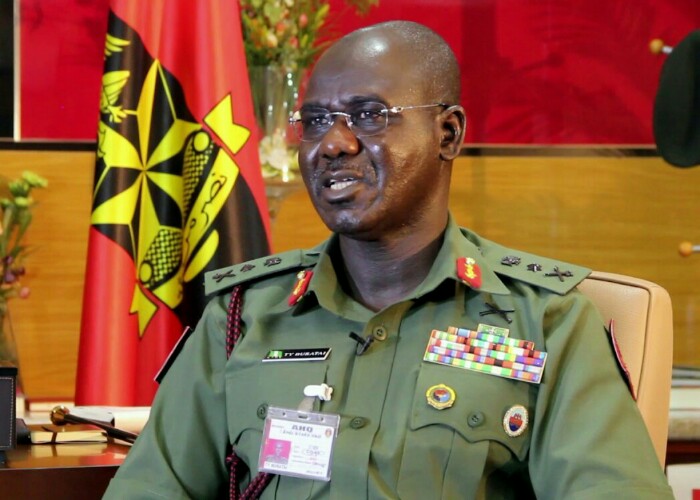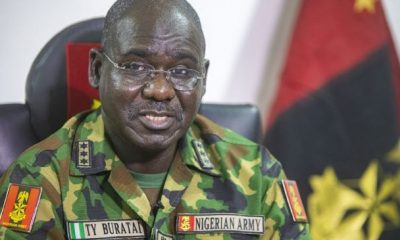Inside Nigeria
‘It Is Not The Job Of The Military To Fight Boko Haram’ — Buratai

The Chief of Army Staff (COAS), Lt. General Tukur Buratai, has stated that the war against Boko Haram could not be won by military might due to series of indoctrination that have been carried out in the north for more than two decades. Buratai said that only 25 per cent of the war falls within the ambit of the military.
The rest, according to him, is for the civil populace to handle. He made these declarations yesterday in Lagos during the 2020 Lagos Chamber of Commerce and Industry (LCCI) Security Meets Business Dialogue.
Buratai stated that: “We are fighting the mind. So, can the military fight the mind of the people? That is not the job of the military.
Psychological operation is government- driven. Facility to reach the minds of the people is within the precinct of the governments. Does military have control over religious leaders that preach hate? There is lot of mundane issues that culminated to this problem. And unfortunately, we do not look at these little things that really matter. You see religious leaders addressing congregation violently on social media to instigate violence against other people.”
He urged Nigerians to own the military and other security agencies and support them with information to enable them win the fight against Boko Haram.
He also debunked the insinuation that there was no synergy between the security agencies in the fight against mounting insecurity facing the country. “It is easy to sit in our rooms and make conjectures even though we are not on the ground. In 2013 the international community issued a warning that foreigners should not go beyond Lagos. But starting in October 2015 they started coming. Can this be achieved without synergy?” he asked.
Buratai also regretted that the country failed to develop the “Ogbunigwe” that was invented by Biafra during the Nigerian civil war and lamented that Nigeria’s allies were denying the country strategic military supplies needed to combat insurgency.
He said: “We all know how the armed forces have been deprived of what it is supposed to have in terms of equipment. There was civil war in this country between 1967 and 1970. Did all our allies support Nigeria as a country? Those Nigeria relied upon for the supply of equipment disappointed her. We are experiencing the same thing with Boko Haram. Some of the arms the government has paid for since 2017 and 2018 have not been supplied. As I speak, no pin has arrived Nigeria. Will Boko Haram sleep and wait till our arm arrives? These are the issues.”
He said that during the civil war, the ingenuity of the Biafrans produced the “Ogbunigwe” but Nigeria paid no attention in developing it. He therefore, called for a detailed research and development to enable Nigeria to produce some of these equipment domestically. “Honestly, this is the crux of the mater. As Nigerians we must develop our own solutions. In doing this we need help and assistance,” he said.
The Chief of Defence Staff, General Abayomi Olonisakin, who was represented by Air Vice Marshall Ado Inuwa, regretted that Nigeria’s security challenges which would have been treated when it was a small ailment has now become cancerous.
Olanisakin noted that “Nigeria is at war whether we like it or not,” and called for all hands to be on deck rather than the current attitude where Nigerians viewed the country’s security challenges as personal problem of the security agencies. “The Boko Haram issue has lingered for too long. We cannot see a group that is a rag-tag militia holding up a nation for almost 10 years now if it is not having adequate supplies and logistics. It is not possible. Something is really wrong somewhere,” he said.
The Secretary to the Government of the Federation, Mr. Boss Mustapha, who was represented by the Permanent Secretary in the Office of SGF, Dr. Amina Shamaki, said that the country needed to strengthen its moral fabrics in order to win the war against insecurity. “If we all account for every member of our families and uphold the tenets of moral, religious, cultural, societal and traditional values, there will be no terrorists, bandits, robbers, arms smugglers, child traffickers, cattle rustlers, militants, etc. And, the work that our government, military and security agencies are doing, will become positively, evident,” he said.
The Lagos State Police Commissioner, Mr. Zubairu Muazu, noted that community policing is the way to go in finding lasting solution to the insecurity challenges facing the country. Similarly, the Chief of Naval Staff, Vice Admiral Ibok Ekwe Ibas, who was represented by the Flag Officer Commanding the Western Naval Command, Rear Admiral O B Daji, said the navy is fishing out foreigners that carry out 90 per cent of crimes in Tarkwa Bay Beach in Lagos to protect maritime business. In her opening remark, the President of LCCI, Mrs Toki Mabogunje, said that “insecurity erodes business and investors’ confidence, resulting in disruption of domestic supply chains and weakening of capital formation required to drive significant economic growth as Nigeria finds it more challenging for us as a country to attract new investment and grow the economy.”










